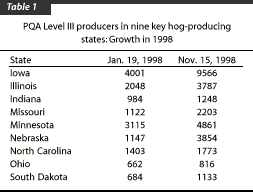AASP Pork Producer Partners Activities — March 1999
AASP Pork Producer Partnerssm activities |
 The recent packer requirements that pork producers
be PQA Level III certified before being allowed to market their
hogs have resulted in large increases in the numbers of PQA Level
III producers during the past year.
The recent packer requirements that pork producers
be PQA Level III certified before being allowed to market their
hogs have resulted in large increases in the numbers of PQA Level
III producers during the past year.
Farmland was the first to require PQA Level III certification (by September 1, 1998). Hormel/Rochelle Foods and Swift & Company required certification by January 1, 1999, and Hatfield’s deadline is July 1, 1999. Other packers–e.g., IBP, Morrell, and Seaboard–are ‘strongly encouraging’ compliance.
In early 1998, the PQA Level III producer total for nine key pork producing states was 15,166. By late 1998, the total had increased by 92% to 29,241 (Table 1). Total PQA Level III producers for all states on January 19, 1998 was approximately 20,000. By November 15, 1998, the total stood at approximately 35,000.
Veterinarians have played an important role in helping producers meet the packer requirements for PQA Level III certification. As of January 19, 1998, there was a total of 1838 PQA Level III verifiers. By late 1998, the total was 2583, with veterinarians representing over 80% of these verifiers, and agricultural educators and extension livestock specialists comprising the remainder.
The NPPC is currently in the process of developing a new verifier’s teaching package for the PQA program. This package will include a PQA/Hazard Analysis Critical Control Points (HACCP) orientation video and a 30-minute PQA teaching video, as well as other teaching materials.
The NPPC is also working with a group of producers, veterinarians, youth educators, livestock specialists, and packers to develop a PQA educational curriculum for youth. Young pork producers must now be certified PQA Level III before they can sell hogs at state fairs. 4H and the NPPC estimate that approximately 200,000 youngsters will be affected by this requirement. The youth curriculum is designed to teach the Ten Good Production Practices specifically to younger producers.
The complete educational package is available to educators and verifiers through the NPPC.
Over the past 2 years, the NPPC has offered three PQA verifier training classes, mostly aimed at agricultural educators. The NPPC Education Program Manager Kellie McGuire states that in the future, new PQA verifiers may be required to participate in formal verifier training classes (current verifiers may or may not have completed any formal verifier training). Questions concerning the new PQA verifier educational materials or about future training classes should be directed to Kellie McGuire at 515-223-3536.
–Contributed by Dr. Teddi Wolff,
AASP Public Relations Committee
This page last updated .